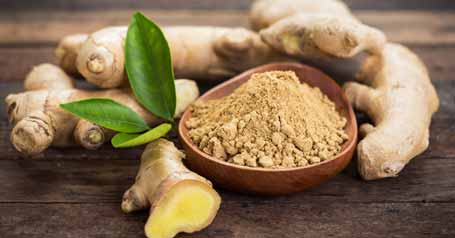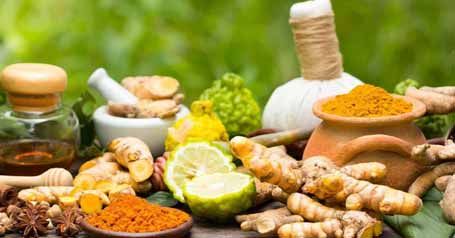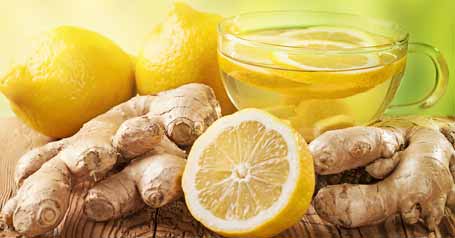I grew up in a small tropical island where herbal medicine was – and still is – the norm instead of the alternative. The child in me will always remember the image of my brothers, my cousins, and myself lined up outside my mother’s kitchen waiting for our morning tea. We had to drink two different types of tea: Te de chivo “goat tea” and Te de gengibre “ginger tea”. The former had to be the nastiest concoction ever invented by Caribbean mothers, who wanted to torture innocent children in the name of worm-free bellies. The latter was a child’s most cherished reward, for its delicious powerful taste made your tongue tingle, while taking away the revolting aftertaste of goat tea. My affair with ginger began before I knew about its medicinal properties or about its Chinese roots. However, the somewhat sour taste of ginkgo biloba, did not reach my lips until many years later.

I did not learn about the healing powers of ginger and ginkgo biloba until I went to Marine Corps Boot Camp. I had been training for two weeks before I had the worse menstrual experience of my life. The cramps were so horrible that I wanted to bang my head against the wall, but I didn’t; I was more afraid of getting in trouble with my Drill Instructors, than of dealing with the excruciating pain. I lie in my rack shaking and sweating profusely, until my bunkmate got too scared to keep the secret; she decided to call the Drill Instructor on guard and inform her about my dreadful state. I was allowed to go to the hospital five hours later – don’t grimace, that was fast in Marine Corps time. To know more about the https://www.laweekly.com/vitaae-reviews-best-brain-supplement-with-anti-aging-effect/, read here.
Rediscovering Ginger: I described my pain to the Navy doctor and he performed a few simple tests, then a more complex one that consisted in collecting urine in a way which I rather not describe. After a few moments he asked me about what had my civilian doctor prescribed for the treatment of my dysmenorrhea. First I panicked, then I ventured to ask, “how did I get an STD when I haven’t even had sex yet?” He gave me that look, which tells the listener that the speaker knows just how ignorant he or she is, but he did not convey the look in words, instead he calmly said, “dysmenorrhea is the medical term for severe menstrual pain”. I shook myself out of the dumb spell, before I told him that it was my first time experiencing cramps that severe, and that I had never been prescribed anything to regulate my period. I also told him that the only thing I had ever taken – religiously – during that time of the month was ginger tea. He smiled and wrote me a prescription for ginger capsules. I frowned and felt dumb again, for at the time I didn’t know that ginger came in capsules.

Dealing Ginkgo Biloba: I had been in Boot Camp for two months, before I had to write to a dear friend and ask him for some herbal contraband. We had been smuggling chocolates in tampon tubes – I know grossly genius – so I knew that I could get certain things in, without having to face the fury of the Drill Instructors. I asked him for something natural that could take care of the muscular fatigue brought up by hours of drilling, hiking, and running. Our medic had given the entire platoon an obscene amount of Motrin, but ibuprofen just doesn’t do it for me. My friend talked to his mom, and she recommended ginkgo biloba; my legs are shaking right now, remembering the thrill of opening the first tube that camouflaged pure natural healing. I continued to use gingko biloba throughout my Marine Corps career, but I’m a tea kind of girl, so I switched from pills to tea the first chance I got. I used to drink a strong cup of ginkgo biloba tea right before my Physical Fitness Test, which included a three-mile run. I believe that the ginkgo biloba helped to keep my lower extremities nice and loose for the task at hand. And although I can not offer any personal evidence to show that ginkgo biloba can improved brain functioning, I can certainly say that it was quite possible that this Chinese herbal medicine enhanced my muscle memory, for my legs have always remembered to run, really, really fast.
The Medical “Facts”: In 2008, a study conduced by the University of Maryland Medical Center (UMDC), implied that ginkgo biloba could be used for dementia, Alzheimer’s disease, eye problems, circulation issues, erectile dysfunction (a problem I hope not to experience), memory impairment, altitude sickness, asthma, depression, disorientation, headaches, high blood pressure, vertigo and more. The UMDC list of possible uses for ginger was a little shorter than the one for ginkgo biloba, but it was just as impressive. It suggested that ginger could be used to deal with motion sickness, inflammation, to lower cholesterol and high blood pressure, to get rid of nausea, and even that it could function as an anticancer agent.
All that medical research sounds remarkable, but I must recommend caution, for if you were to take a closer look at the UMDC sources I’ve provided, you will notice that the list of possible side effects is even longer that the one of suggested uses. Some of the side effects of these two Chinese herbal medicine, that when taken carefully have the potential to work wonders, include but are not limited to the following: gastrointestinal problems, headaches, skin reactions, dizziness, platelet related bleeding complications, and mild heartburn. And both herbal remedies can be very dangerous when taken in combination with certain antidepressants, blood thinners, and/or several other medications. So it would be a very good idea to consult with your doctor, before running out to buy what seems to be the herbal cure for everything.

Recap: You shouldn’t allow the uncertain possibility of side effects to keep you away from tasting delicious herbal healing. Remember that ginger has helped me deal with dysmenorrhea, ginkgo biloba has been one of my most powerful allies against muscular fatigue, and I am happy to share with you the fact that I have not suffered any side effects that I know of. Nevertheless, your decision to start taking ginger, ginkgo biloba, or any other herbal medicine, should not be based on one person’s successful story.
(2008) University of Maryland Medical Center, Baltimore, MD.